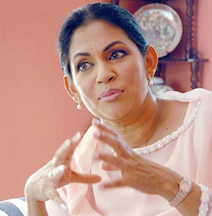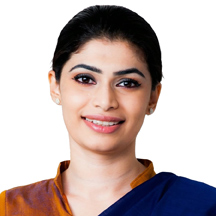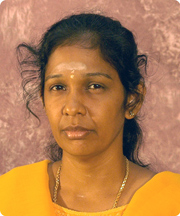Empowerment interrupted!
Sri Lanka may have had the worlds first female Prime
Minister, but as the August 17 polls proved, women are still a long way
from cracking the political glass ceiling:
by Dilrukshi Handunnetti
|

Rosy Senanayake (ANCL) |
On August 17, Sri Lankan voters elected 196 members to the eighth
Parliament, including ten women. Of the ten, six - Thalatha Athukorala,
Hirunika Premachandra, Indunil Amarasena, Vijayakala Maheswaran,
Chandrani Bandara and Rohini Wijeratne - represent the United National
Party (UNP).
Four - Shriyani Wijewickrema, Sumedha G. Jayasena, Pavithradevi
Wanniarachchi and Geetha Kumarasinghe have been elected from the United
Peoples' Freedom Alliance (UPFA). This result comes after rigorous and
continuous debate and lobbying in the country, generated by progressive
women's groups, demanding the inclusion of more women in the new
legislature as well as the inclusion of women of substance.
This year, there was strong focus among lobby groups, to have the
number of women representatives in Parliament increased, and as a first
step, to have more women to be given party endorsement as candidates.
The lobbying was not confined to have the numbers increased but
significant emphasis lay on the quality of those women candidates.
Long struggle
It had been a long struggle for the Sri Lankan women to get even to
this point, in a country where there is a general belief that women
already have their due place in society and enjoy equal status. It is a
stereotype that had been difficult to break with most refusing to
acknowledge that women still have to deal with the proverbial glass
ceiling, especially when they wish to knock on parliamentary doors.
|

Hirunika Premachandra
(newsfirst.lk) |
It is a fact that, despite vigorous debate and lobbying for breaking
the stereotypes, Sri Lankans are yet to overcome their feudal tendencies
of voting for family names. In the case of women, those whose lives have
been struck by some tragedy linked to politics enjoy a better
opportunity of garnering support and being swept into power no a wave of
sympathy, that ordinary women who may place their best bets on
performance.
If sympathy and family name provided the springboard for the late
Sirimavo Bandaranaike to get elected as the island's Prime Minister and
world's first, there is little to show that this reflected a progressive
tendency among the voters. This inclination towards' 'trusted families'
'feudal tendencies,' continue to influence the electorate in a big way
and decades later, women still are not considered a first choice in
Parliament.
The question of what would be the role of a woman parliamentarian is
sometimes discussed. Such questions of performance or behaviour do not
generally arise, with regard to male candidates. "Women often have to
socially justify their decision to enter politics and also demonstrate
that they have substance, two things men are hardly ever asked," noted
Dr. Sepali Kottegoda, Executive director, Women and Media Collective. If
substance was the issue, a case in point is the fate that befell a
pioneering woman politician who has campaigned for women and child
rights - Rosy Senanayake. If performance was a criterion for selection,
then Senanayake's political fortunes should not have dipped so much on
August 17. It is well -known that she is completely self-made and did
not have the traditional support mechanisms to propel her into politics.
Role of political parties
|

Vijayakala Maheswaran
(womencausus.lk) |
In this context, it is important to consider the role of political
parties, in accommodating more women on their nomination lists. In the
South, there was some level of 'consciousness' to include women in the
nomination lists. The United National Party (UNP) has publicly claimed
it was willing to not have a quota yet- in Parliament - but was willing
to include 25% quota on the nomination lists. Others did not even pay
lip service and the standard response was that women were not
forthcoming and if they did, they would have been accommodated.
This claim may be partly true. May be, because at the local
authorities level, this is not so. More and more women have demonstrated
an inclination to become politically active at the local level. But it
is quite different at the provincial or parliamentary level. The level
of engagement is much less, and women suffer from lack of support as
well resources.
It is also where the absence of affirmative action such as a quota
impacts on the level of women's participation. Not being even a second
thought, often, the national lists of political parties include only
men.
It is hoped that given that women represent 51. 5 of the island's
population and do contribute vastly to keep the economy well-oiled, also
because of the traditional barriers and the lack of support mechanisms,
the national list could be used as a tool to accommodate women who may
contribute to the development of the 'other half.' |

